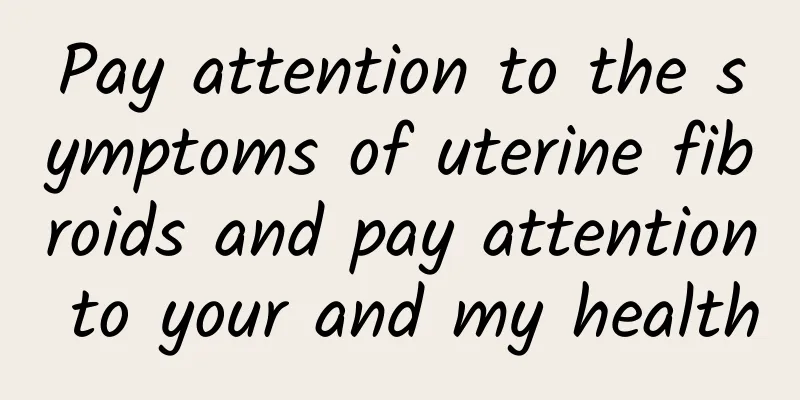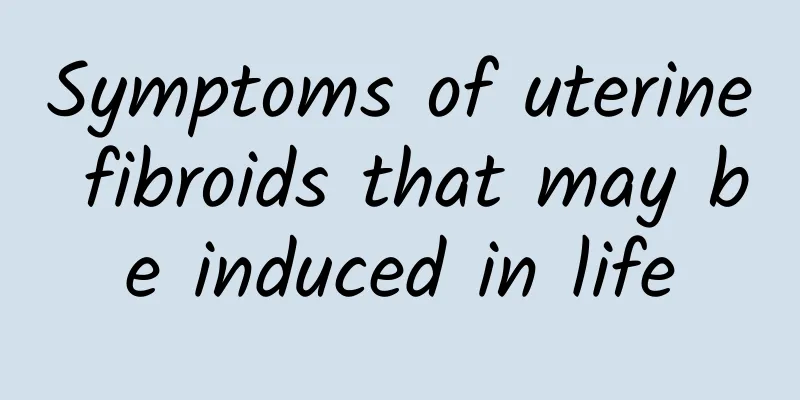Pay attention to the symptoms of uterine fibroids and pay attention to your and my health

|
What are the main symptoms of uterine fibroids? How much do you know about the symptoms of uterine fibroids? Based on which common symptoms of uterine fibroids can we judge that we have uterine fibroids? 1. The first symptom of uterine fibroids is: menorrhagia. The typical symptom of uterine fibroids is menorrhagia, which mostly occurs in submucosal and intramural fibroids, and manifests as menorrhagia, prolonged menstruation or irregular vaginal bleeding. The main reasons for increased bleeding are: the increase of endometrial area, the proliferation of endometrium due to the effect of estrogen, the fibroids hinder the contraction of uterus, and affect the blood circulation, causing endometrial congestion. Due to long-term bleeding of the lower abdominal mass, patients often have varying degrees of anemia. 2. Compression is also a common symptom of uterine fibroids: Fibroids located in the lower part of the uterus and the cervix can compress pelvic tissues and nerves, causing lower abdominal pain and back pain. Fibroids growing forward or backward can compress the bladder, urethra or rectum, causing frequent urination, dysuria, urinary retention or constipation. When fibroids grow to both sides, they form broad ligament fibroids, which can compress the ureter and cause hydroureteral or renal pelvis; if they compress pelvic blood vessels and lymphatic vessels, they can cause lower limb edema. 3. Abdominal mass: When the subserosal or intramural fibroids grow beyond the pelvic cavity, patients can usually feel the mass themselves and go to the hospital for treatment, which may be accompanied by a feeling of falling. 4. Pain: In addition to the pain caused by compression of the pelvic nerves, pedunculated submucosal fibroids cause uterine contractions in the uterine cavity and produce pain. When the fibroids block the cervical canal and hinder the outflow of menstrual blood, it can cause dysmenorrhea. This is also a symptom of uterine fibroids that we need to pay attention to. The above symptoms of uterine fibroids are what we women can judge by ourselves. If you cannot make an accurate judgment, please consult our online experts, who will give you more suggestions and opinions on the symptoms of uterine fibroids. Uterine fibroids http://www..com.cn/fuke/zgjl/ |
<<: Understand the difference between vulvar leukoplakia and other diseases
>>: Do you know how to treat uterine fibroids?
Recommend
Can central amenorrhea be cured?
Can central amenorrhea be cured? This is a highly...
Experts introduce specific nursing points for abortion
For women who have an unexpected pregnancy, abort...
Hyperprolactinemia care precautions
There are many people with hyperprolactinemia in ...
How to treat glandular atrophy
The treatment of glandular atrophy requires a tar...
Nursing care for patients with ovarian cyst pedicle torsion during perioperative period
Ovarian cyst pedicle torsion refers to the twisti...
The harm of adnexitis to women should not be underestimated
Adnexitis refers to inflammation of the fallopian...
How to treat infertility caused by hyperprolactinemia
There are many reasons for hyperprolactinemia, bu...
Treatment methods for irregular menstruation in patients with different constitutions
Menstruation is a normal physiological phenomenon...
You can exercise while playing with your phone! 5 simple exercises to slim your belly and strengthen your thigh muscles
If you are a girl who doesn’t have time to go to ...
What foods are suitable for patients with cervical erosion? 4 dietary taboos for patients with cervical erosion
I believe everyone knows the importance of the ce...
What department should I go to for uterine fibroids and cysts? What should I do if I have uterine fibroids and cysts?
What department should I go to for uterine fibroi...
Potential effects of warning labels on sugary drinks
In some areas, sugary drinks are required to be l...
Riding traces! Cycling can burn 1.5 cups of bubble tea calories
A cup of bubble milk tea has 410 calories. The Ta...
Seventy percent of uterine fibroid patients are under 30 years old. Uterine fibroids favor young unmarried women.
Seventy percent of uterine fibroid patients are u...
Will menopause heal on its own?
Menopause is a common gynecological disease, whic...









